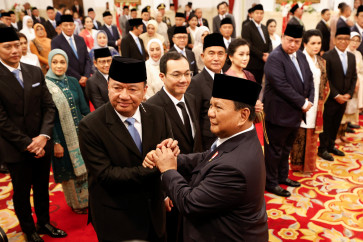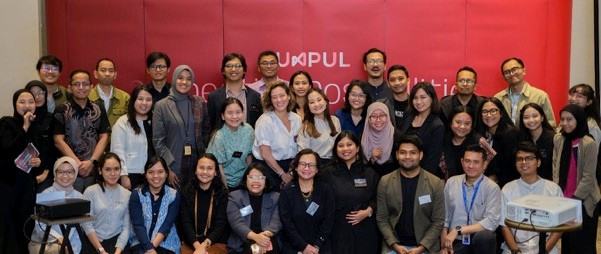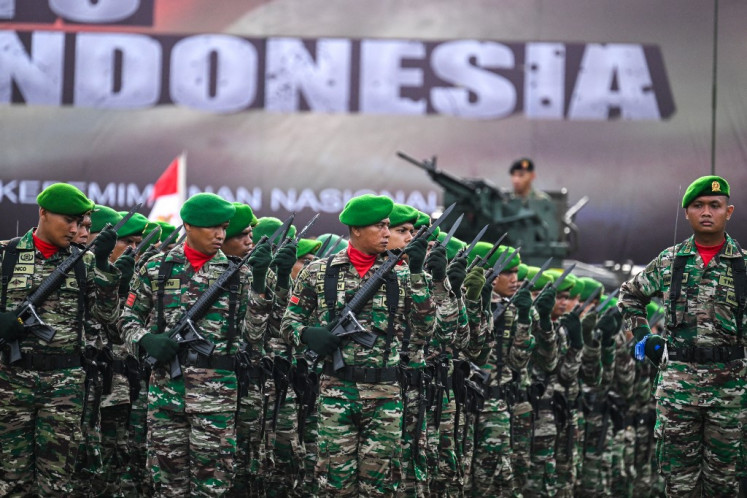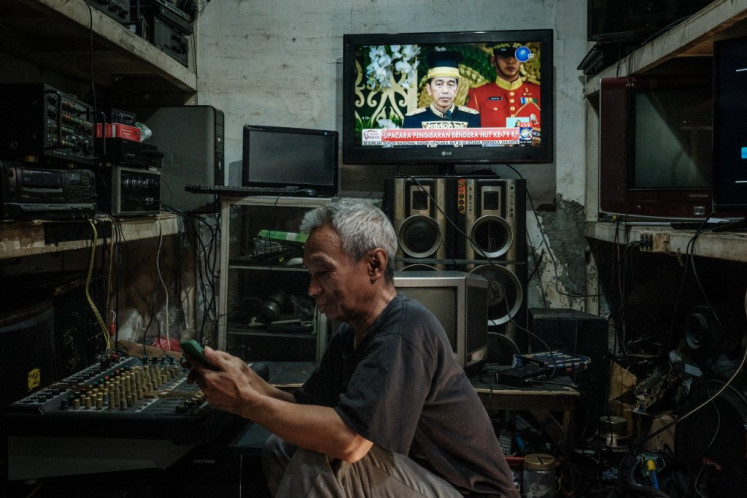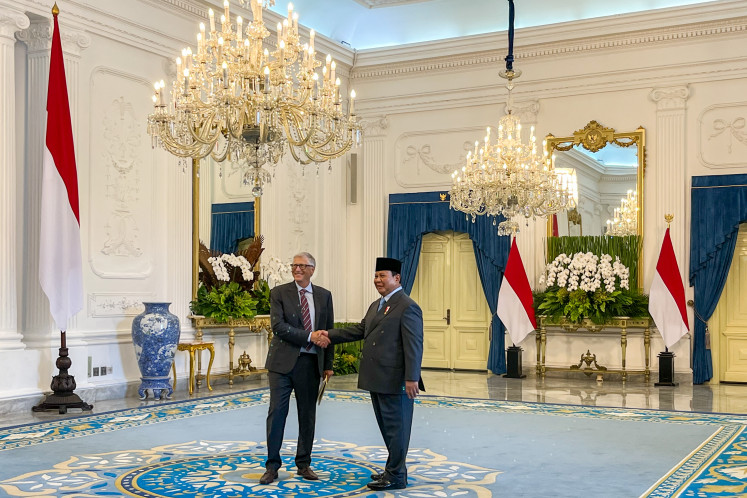Waste recycling goes hi-tech
Modern industrial life has brought with it an excess of trash, which is damaging the environment while causing various natural disasters such as floods and landslides.
Change text size
Gift Premium Articles
to Anyone
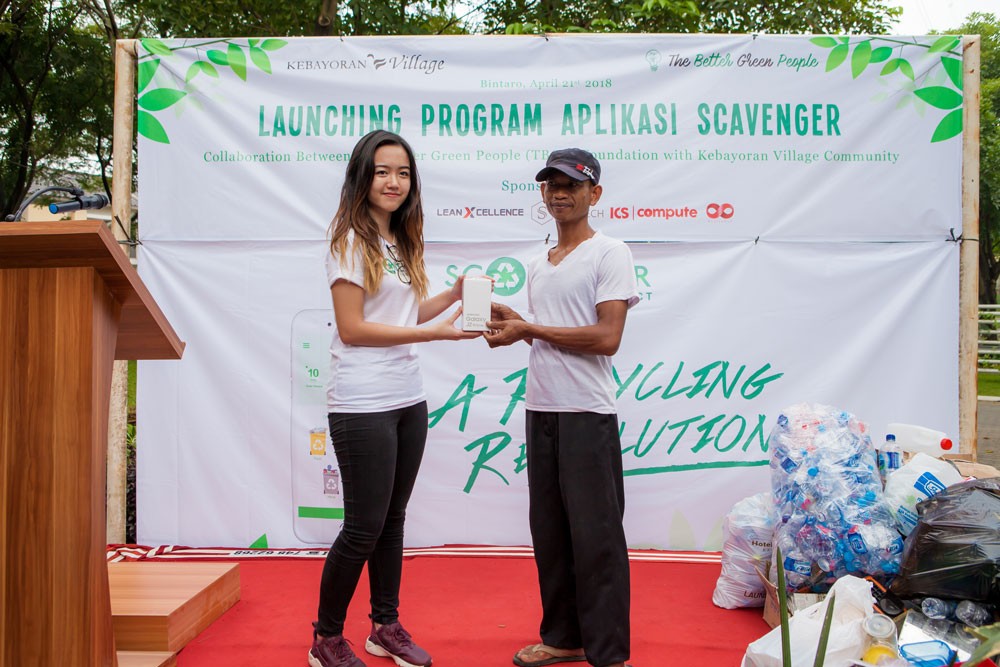 Building bridges for environmental sustainability: Scavenger Indonesia project founder Fio Wibawa (left) symbolically hands over a smartphone to Dartam (right), scavengers coordinator in the Kebayoran Village housing complex area in Bintaro, South Tangerang to mark the launch of the Scavenger application. The waste-recycling management application helps households sort out their trash while connecting them to scavengers who will also sort it out for recycling purposes. (Photo courtesy of Scavenger Indonesia)
Building bridges for environmental sustainability: Scavenger Indonesia project founder Fio Wibawa (left) symbolically hands over a smartphone to Dartam (right), scavengers coordinator in the Kebayoran Village housing complex area in Bintaro, South Tangerang to mark the launch of the Scavenger application. The waste-recycling management application helps households sort out their trash while connecting them to scavengers who will also sort it out for recycling purposes. (Photo courtesy of Scavenger Indonesia)
M
odern industrial life has brought with it an excess of trash, which is damaging the environment while causing various natural disasters such as floods and landslides. This is why many environmental organizations are concerned about this issue and are attempting to find ways to recycle waste in a more effective and efficient manner.
To address this issue, a smartphone application has just been launched to make waste recycling more hi-tech, creating an environmentally friendly platform that can help people to manage their waste-recycling efforts by helping them sort recyclable as well as organic and non-organic waste out and connect them with local scavengers who will distribute the trash for recycling purposes.
The application, called Scavenger, was launched recently by environment-focused non-governmental organization The Better Green People Foundation’s (TBGP Foundation) Scavenger Indonesia project on April 21 in Tangerang, Banten.
Besides helping users sort their trash out based on the above mentioned types, the platform also connects them with local scavengers who will collect the trash and sort it out based on the recycling categories in different trash bags, guaranteeing that the recyclables will not be mixed up with the non-recyclables. The scavengers will then distribute the trash for recycling purposes.
Therefore, this platform is accessible to everyone concerned about mitigating the negative impact of industrial waste while benefiting scavengers along the way.
To test the application’s adoption among users, residents and scavengers alike, the foundation invented the platform in partnership with the Kebayoran Village housing complex in Bintaro, South Tangerang, as a pilot project site.
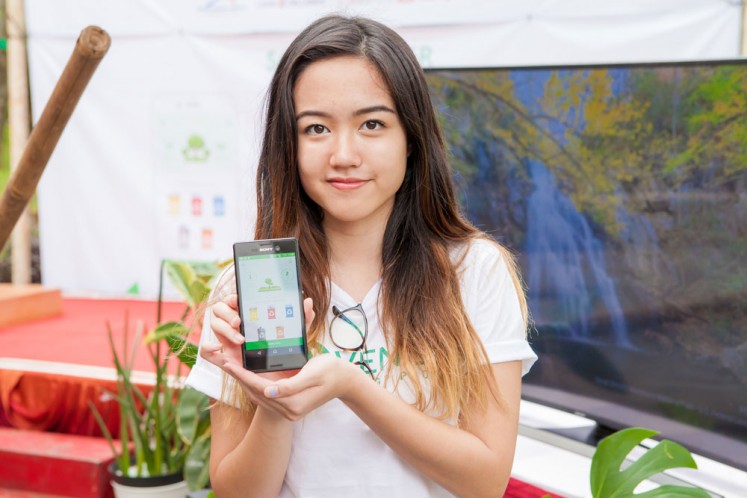
“Currently, Indonesians have not yet become accustomed to sorting their trash out for recycling purposes; their usual habit is to mix [the recyclable and non-recyclable] waste types into one plastic bag before disposing of it all at once,” Scavenger Indonesia project founder Fio Wibawa said. Sometimes, however, the other way around might occur – a resident has already sorted his household trash out, only to get a scavenger mixing the recyclables with the non-recyclables within one large bag.
The application seeks to provide a solution for this problem, helping manage waste recycling from its downstream aspect – the households – right down on to its upstream aspect – distribution and management by scavengers.
Through this innovation, the foundation seeks to create a more environmentally clean and pristine Indonesia. “Our mission is to turn Indonesia into a habitable place for all species. [This big mission] can be kick-started through sorting trash out in society’s smallest community unit: the household,” she argued.
The pilot project in the Bintaro housing complex also seeks to gauge people’s enthusiasm for adopting the application. In order to establish the application as an ongoing communication platform between residents and scavengers in managing their waste-recycling efforts, the foundation also trained local scavengers in Bintaro on how to use the application so they could work together with local residents in collecting and sorting out their trash.
Upon completing the pilot project, the foundation hopes to expand the application’s adoption to other neighborhood areas and housing complexes in Indonesia by connecting as many residents and scavengers as possible through its system to manage waste recycling in a more effective and efficient way.


